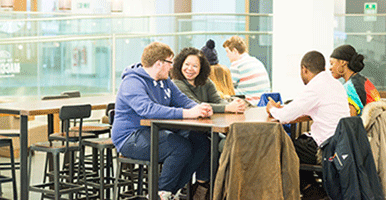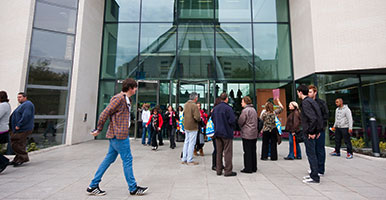Your application form, once submitted through UCAS, will be sent to all your university choices for consideration. Once LJMU receives an application we aim to assess your form on its merits as quickly and efficiently as possible.
For some programmes decisions are based entirely on your application form, whilst others will require you to undertake an interview, audition, short assessment test or present a portfolio of work. Details of additional methods of assessment are outlined in our entry criteria - please see the relevant course fact file.
What is a 'Typical Offer'? (YouTube)
Unconditional offer
You will be made an unconditional offer if you satisfy the entrance criteria at the point of application e.g. you are a mature student or already have all your qualifications.
Conditional offer
A conditional offer will be made if you have not sat for your examinations at the point of application, or are awaiting results; the offer will be based on securing specific grades or other criteria.
A changed course offer
If we have considered your application and think an alternative programme would be more suitable, we will contact you with an unconditional or conditional offer for a different course. You do not have to accept this offer.
A rejection
If we have read through your application and are unable to make you an offer, we will unfortunately have to reject your application.
Making your firm and insurance choices
Once you have received decisions back from all your UCAS university choices, you will be asked to select two universities to make your firm (first) choice and insurance (second) choice. You must decline all other universities who have made you an offer as applicants are permitted to have just two choices at this stage.
Some courses will require you to complete a Disclosure and Barring Service (DBS) Disclosure, often known as a DBS check, to enrol on the course. A DBS check allows us to check your criminal record to decide whether it is suitable for you to work with vulnerable groups during your study.
You will have received an email from dbs@ljmu.disclosures.co.uk containing your personalised link to submit your details. This is through a secure service called Atlantic Data.
There are just four simple steps to completing your DBS check, but you must start this process as soon as you can as a delay in receiving your DBS might mean a delay in enrolling on your course and receiving your Student Finance payments.
Step one
Submit your personal details
After following the link emailed to you, you will need to confirm your email address and date of birth as well as choose a password.
Once inside the system, you will need to submit your personal details. This includes your name, any previous names, and your addresses for the last five years.
There are certain documents which you will need to verify your ID to complete your application and you will need to confirm which identity documents you will be using at this stage.
When selecting your ID documents, you must select at least one form of ID from the first screen - these are primary ID documents. If you have less than three ID documents from this first page, select “No” and additional secondary documents will become available to choose from. All of these forms of secondary ID must state the same name and the same address if an address is provided on the ID document.
It’s essential that your name matches across all your identity documents, including middle names. If there have been changes in this across your documents, you will need to let us know by adding them as ‘additional names’.
Remember that you will need to provide original documents, not photocopies, to confirm your identity. If you’re using documents such as bank or utility correspondence to confirm your identity, these need to have been posted to your house – printed electronic versions can’t be accepted, so please request these as early as you can to make sure there are no delays when processing your DBS application.
Step two
Disclose any criminal convictions
At this stage, you will also need to disclose details of any criminal convictions.
It’s really important that you’re honest when disclosing any criminal convictions – doing so doesn’t mean that you won’t pass your DBS check – but failing to do so may mean there is a delay in processing your application or might even mean you cannot start the course.
Step three
Uploading your documents
Next, you will need to confirm your ID documents by uploading photos of the documentation to the Atlantic Data portal. You will be prompted as to how many and which photos to upload.
Step four
Video ID check
Once you have submitted your details and documents you will receive an email to book a 15-minute video call, via WhatsApp or Skype, with an agent who can verify your ID at a time that’s convenient to you.
What happens next
Once you have completed and passed your video ID check, your details will be passed on to DBS who will identify any relevant convictions. You will receive an email to confirm that your DBS has been completed, and details about receiving a hard copy of your DBS certificate.
We will automatically be updated when your DBS check is complete, so there is no need to let us know that you have received this.
If you have used all five choices, and you're not holding any offers, either because you did not receive or have declined your offers, you can add another choice using UCAS Extra.
This is another chance for you to gain a place at university or college. During this period you'll be able to apply to additional universities, or courses, one at a time.
UCAS Extra opens on 26 February and closes 4 July 2025.



